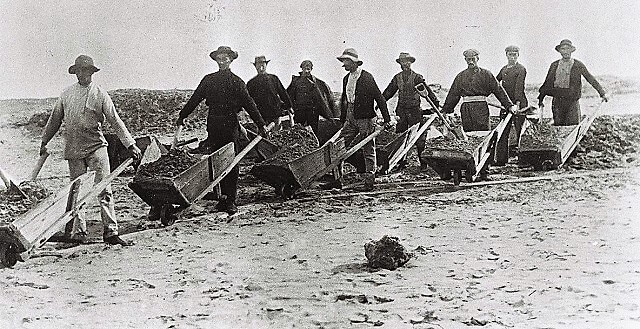
The Ramban (Nachmanides, 1194-1270) interpreted this verse as the Biblical source for the mitzvah to settle and build up the Land of Israel:
“You shall take possession of the Land and settle in it; for I have given you the Land to possess it” (Num. 33:53)
The following remarkable story was told by Mr. Yigal Gal-Ezer, who served as Israel’s vice state comptroller. In his younger days, Gal-Ezer would often visit Rav Kook’s home to be inspired by his holy presence.
The Yemenite Visitor
During one of my visits, I found the rabbi in his study, engrossed in a complex Talmudic topic. Suddenly I heard a hesitant knocking at the door. The door opened partially, and a Yemenite Jew — slight of stature, with streaks of white in his beard and long peiyot — entered the room.
The guest closed the door behind him and stood in the doorway, his back to the door. He lowered his head to the floor, afraid to look at the rabbi directly.
Rav Kook raised his eyes from his Talmud and looked at the man kindly. “Come closer, my son.” With a gentle voice, the rabbi tried to instill confidence in the visitor.
With slow steps, the man approached the rabbi’s desk. He remained standing, head down.
“What troubles you, my son?”
“Honored rabbi,” the Yemenite said. “I came to ask the rabbi an important question.”
“Ask, my son, ask.”
“For twenty-five years, I have engaged in backbreaking labor, working from morning till evening. I weeded plots of land so that orchards could be planted. I planted saplings, removed stones from fields, and dug foundations for buildings in Eretz Yisrael. I have spent all my strength in exhausting manual labor. And yet I barely earn enough to support my family.”
Embarrassed, the Yemenite lowered his voice. “I would like to ask,” he said hesitantly, “is it permissible for me to immigrate to America? Perhaps there my fortune will shine and I will be able to properly support my family....” The visitor finished his short speech and stood in silence.
For several minutes, Rav Kook remained deep in thought. Suddenly, he rose from his seat, pointed to his chair, and instructed the man, “Sit.”
The visitor was filled with trepidation. “Honored Rabbi,” he stammered. “It is improper that a stranger should sit on your chair.”
“Sit,” the rabbi repeated firmly.
With short, reluctant steps, the Yemenite circled around the desk until he reached the rabbi’s chair. He slowly lowered himself into the seat.
The Dream
As soon as he settled in he chair, his head dropped to the desk and he fell into a deep sleep. A short while later, he awoke, startled.
“What happened when you slept?” asked the Rav.
“I dreamt that I had passed on to the next world,” he recounted. “My soul ascended to heaven. When I reached heaven’s gates, an angel stood at the entrance and directed me to the heavenly court. There I saw scales — scales of justice.”
The Yemenite laborer continued his account. “Suddenly, carriages drawn by horses rushed in front of me. The carriages were loaded with packages. Some of the packages were small, some medium-sized, and some large. The angels proceeded to unload the packages and place them on one side of the scales. That side of the scales plunged downwards due to the weight, until it nearly touched the ground.”
“What is the meaning of these packages?” I asked the angel standing before me.
“These,” the angel responded, “are your sins and transgressions from your earthly days. Everything is accounted for.”
Hearing this, my spirits sank.
Then other carriages arrived. These carriages were loaded with dirt, rocks, stones, and sand. As the angels loaded them on the other side of the scales, it began to lift up — slightly — the side bearing the sins and transgressions.
“What is the meaning of these bundles of dirt?” I asked.
“These are the stones, the rocks, and the dirt which your hands labored to remove from the ground of the Holy Land,” the angel explained. “They have come to speak in your defense, testifying to your role in the mitzvah of yishuv ha’aretz, settling the Land of Israel.”
“Trembling, I stared at the side of merits. I watched as it dipped lower and lower, lifting the opposite side. Finally, the side of merits stopped moving. It came to a halt as it outweighed the sins, but just barely.”
“You see, my son,” Rav Kook told the man gently. “You have received your answer from Heaven.”
(Stories from the Land of Israel. Adapted from Malachim Kivnei Adam, pp. 321-322)
Illustration image: Photo of Jewish pioneers carting soil over the sands of Tel Aviv (1910)





